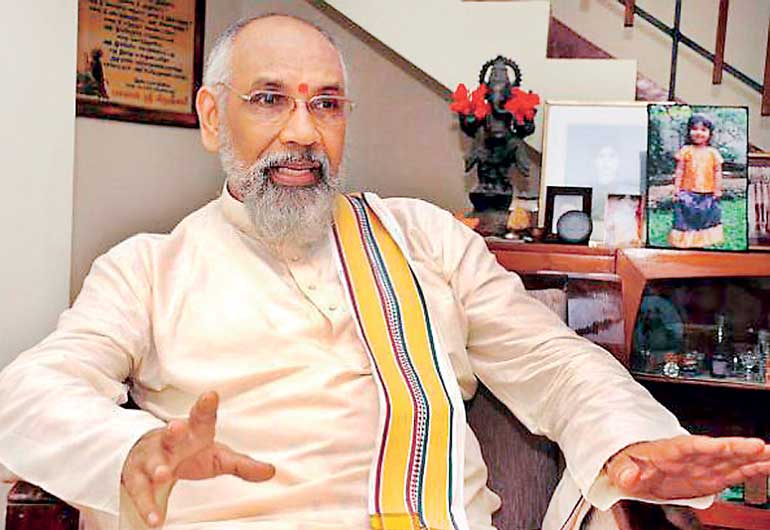Sunday Feb 15, 2026
Sunday Feb 15, 2026
Wednesday, 6 January 2016 00:00 - - {{hitsCtrl.values.hits}}

I have been a columnist for the Sinhala monthly publication Samabima. In early 2013, I along with the fellow columnists, were criticised by a Buddhist monk that we were writing against the Sinhala extremism but not against Tamil or Muslim extremism. I have responded to the criticism by stating that we were against all forms of extremism irrespective of whether those were Sinhala, Tamil or Muslim. However, at that time the dominant ideology was Sinhala extremism and as a result, all the other communities were marginalised. We were against that situation which was the need of the hour and it did not mean that we were in favour of Tamil or Muslim extremism.
The time has come to write about Northern politics. When C.V. Wigneswaran’s name was nominated as the chief ministerial candidate by Sampanthan, according to columnist D.B.S. Jeyaraj, none of the party leaders of TNA was in favour. Instead, they proposed the name of Senathirajah, a fellow ITAK member of Sampanthan. Finally Sampanthan was able to get the approval of other party leaders. Jeyaraj himself was not in favour of Wigneswaran, based on the tone of his articles written at that time. After winning the election, Wigneswaran came to Colombo along with Sampanthan to take oaths in front of President Rajapaksa although it was not mandatory. In an article written to this paper, I praised Wigneswaran and Sampanthan for this political gesture.
Lasting policy decisions
Wigneswaran faced numerous obstacles in continuing in the capacity of Chief Minister. His political gesture was never returned. He had to face a tug-of-war with the then Governor. This was the case in the Eastern Provincial Council as well. He had no authority to have a secretary to the council of his choice. Although the situation started changing with the election of the new President in January 2015, more recently, by increasing the allocation to decentralised budget of the MPs, the Government interfered with the work of provincial councils. However, the speed of change since January 2015 had been slow, which was applicable not only for the north but also for the whole country.
The country had two main problems at hand during the previous regime, one was authoritarianism of the regime and the other was non-reconciliatory approach to the ethnic problem. The south is not happy at the way things have been happening after the election, mainly because of the slow pace of the change. That is attributable to the composition of the Government. It is mandatory to maintain this composition in order to have a new Constitution which would be a solution at the fundamental level for the two main problems the country had during the previous regime.
In respect of the ethnic problem, the country had ample opportunities to avoid the war had the national, opposition and minority leaders adopted non-divisive politics. When solutions were agreed by the Government, those had to be abandoned due to political pressure of the Opposition. It happened repeatedly although the parties shifted sides from Government to Opposition and vice versa. Therefore, this composition of the Government is ideal for lasting policy decisions.
The spoilers
In the way forward, the ‘spoilers’ should be identified and the forward thinkers should not allow them to hijack the process as mentioned by Jayampathy Wickramaratne. There were spoilers in 1957 and 1967. On the other hand, the process the country adopted in drafting the two Constitutions in 1972 and 1978, were merely authoritative. The seeds of the war were sowed after the 1972 Constitution; the 1978 Constitution aggravated it and paved the way for the JVP insurrection as well. As we all know, the impact the 1978 Constitution had on our social structure was devastating.
Therefore, in the constitutional amendment process and in the process of giving more powers to the provinces, the country had not adapted consensual processes. As a result, amendments were either adopted by force of “democratic” power (that was the irony of it) or the governments were forced to withdraw the positive amendments by the spoilers. This is how the democracy operates in the countries of the Asian region in contrast to the countries it originated in, as pointed out by the writer in his articles. This polarisation has to be conquered by consensual politics. That is the task at hand now.
However, during the British period the Colebrooke and Donoughmore Commissions went throughout the country and sought views of the people prior to drafting the constitutional amendments. The Soulbury Commission also went throughout the country. It is a welcome move by the Government to appoint a commission to seek the views of public in relation to the framework of the new Constitution.
The situation will be conducive if there would be consensus in the northern front as well. Due to the operation of Wigneswaran, it seems to be that there is no consensus. He authored ‘genocide’ resolution at the Northern Provincial Council at a crucial time of reconciliation, did not support TNA at the last elections, and recently formed the Tamil People’s Council which he says is an apolitical organisation.
Jeyaraj pointed out in his Daily Mirror article on 12 December, 2015 that when Samantha Power, US Ambassador to the UN, met Wigneswaran in Jaffna recently, he repeated his anti-government tirade. When Power asked him about the situation after the new Government was set up, Wigneswaran kept parroting that nothing had changed and that there was no progress. He was taken aback when the US envoy disagreed strongly. Samantha Power then outlined eleven specific areas of concern to the Sri Lankan Tamils where reasonable progress had been made by the Government. Wigneswaran had no choice other than to admit that progress had indeed been made. Jeyaraj further reported that the Chief Minister then tried to save face by saying not enough progress had been made or speed shown. Power then pointed out that saying “not enough progress” had been made was different to saying “no progress” had been made. However, she agreed that the pace was slow yet understandable within the current political context as discussed in this article as well.
Agitating together
The writer had a similar experience with the Chief Minister and this was prior to the meeting he had with US envoy to the UN.
Shri P. Chidambaram, former Union Minister of Finance of India, came to Sri Lanka recently to deliver an annual tax oration of the Institute of Chartered Accountants of Sri Lanka. He wanted to visit Jaffna to get firsthand information of the civilian life there. I accompanied him in this journey. A meeting was arranged with Wigneswaran as well. Prior to meeting with Wigneswaran, I told Chidambaram in the presence of the officials of the Indian High Commission of Jaffna that Wigneswaran was a well-respected judge of the Supreme Court of Sri Lanka. Praising him, I specially mentioned his keynote speech at the annual convocation of the Bar Association of Sri Lanka in March 2013 where he criticised the act of Parliament to remove CJ Bandaranayake. I also told Chidambaram that the political line of Wigneswaran was then somewhat different to that of Sampanthan.
I happened to be present at the meeting of the two and only three of us were there. Wigneswaran did the same thing as he did at the meeting with Power as reported by Jeyaraj. He started the discussion with a long list of complaints against the Government as if there was nothing positive towards the Tamils by the Government. He said that the Central Government was taking power back. After a while I asked two gentlemen whether I can say a few words. Although I was not entitled to do so, both of them readily accepted my offer. I told him that in the south the same thing happened. If the Central Government wanted to take over a good school from the provincial council, it was made a national school and was taken over. Therefore, we should agitate together, not separately. He responded that he liaised with the chief ministers of other provinces. Chidambaram like Power, although not aggressive as such, advised the Chief Minister to work with the Government to have a permanent solution to the issue.
After I came back to Colombo, I told his Secretary Sundaralingam that a delegation of civil society could be brought from the south to Jaffna to discuss the issues and to have a bridge between the two sides if the Chief Minister would agree but I did not get any response.
The main question remains whether Wigneswaran would act as a spoiler? I sincerely hope he would not. We are a nation which missed a lot of opportunities. We opened the economy before India did. At that time, if the ethnic problem was solved, we would probably be in the level of ASEAN countries now. It is time to act and move forward rather than paving the way for the spoilers.